Pregnancy and Immunizations
This toolkit provides resources and downloadable materials to help you educate your community about the benefits of staying up to date on immunizations during pregnancy. For more information visit our Immunization for a Healthy Pregnancy webpage.
CDPH Material Co-brand Disclaimer Local health jurisdictions (LHJs) and community-based organizations (CBOs) may co-brand materials created by CDPH (those in CDPH Office of Communications Toolkits) by adding their agency logo next to or near the CDPH logo. Be sure there is ample space between the two logos. Materials may not be altered or edited in any other way, including removal or adjustment of the CDPH logo.
Fact Sheet

Immunization for a Healthy Pregnancy (English, PDF)
Video
RSV Vaccine During Pregnancy (Released December 2023)
California Surgeon General, Dr. Diana Ramos, discusses the benefits of RSV immunization (as well as Tdap, COVID-19 and flu vaccination) during pregnancy.
Vacunas contra el VRS durante el embarazo (publicado en diciembre del 2023)
La cirujana general de California, Dra. Diana Ramos, habla sobre los beneficios de la vacuna contra el VRS (incluidas las vacunas contra la tosferina (Tdap), la influenza y el COVID-19) durante el embarazo.
Social Media
Use the following images and messages on social media. Right click on each image to “save as.”
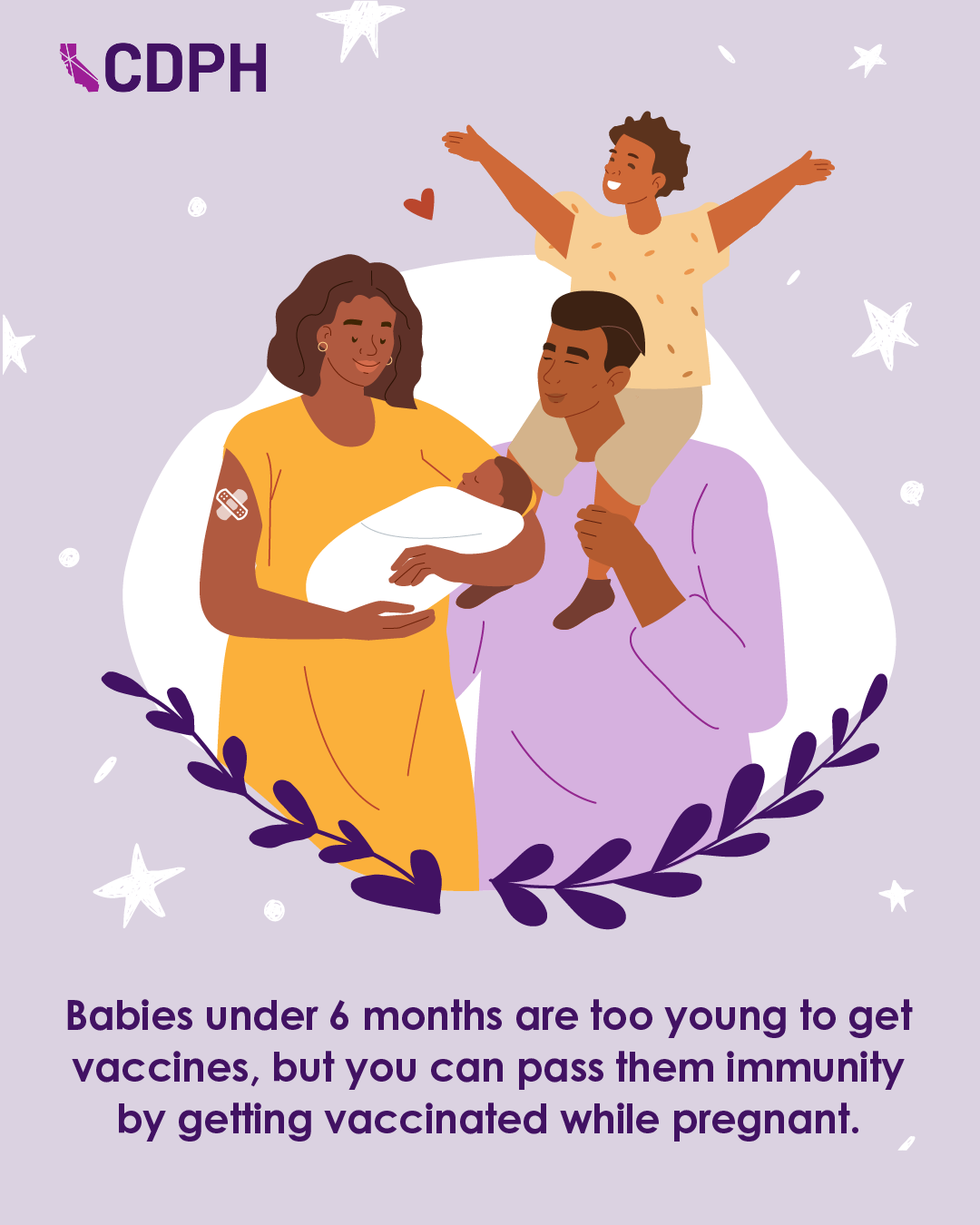
Suggested Messaging: Protect your growing family. Certain vaccines are recommended for anyone who is pregnant. These vaccines lower the chances of you and your family getting very sick or needing to be hospitalized from respiratory illnesses, like COVID-19, flu, whooping cough and RSV.
Bluesky/X: Protect your growing family. Certain vaccines are recommended for anyone who is pregnant. These vaccines lower the chances of you and your family getting very sick or hospitalized from respiratory illnesses, like COVID-19, flu, whooping cough and RSV. go.cdph.ca.gov/pregnancyvaccines. |
|
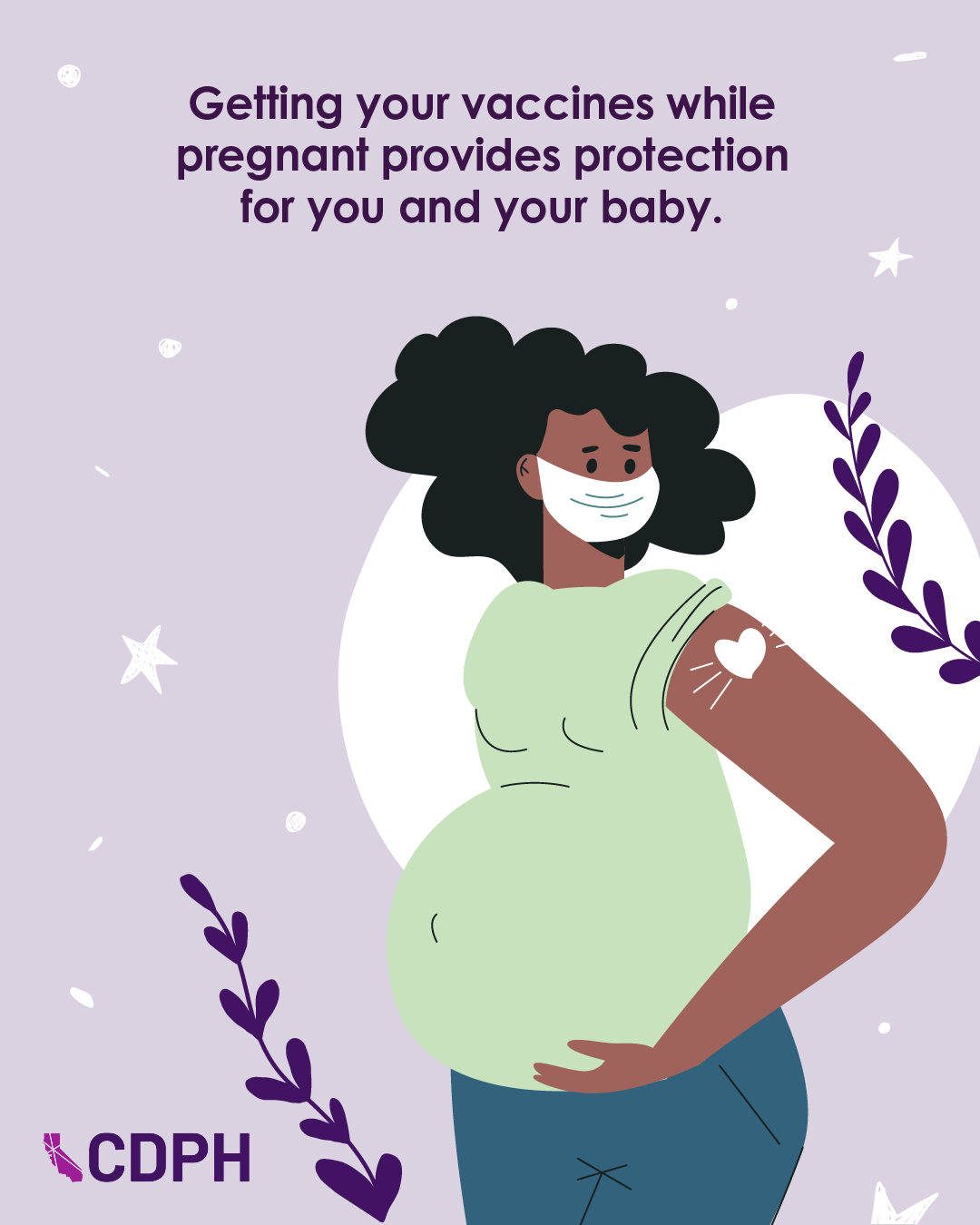
Suggested Messaging: If you’re pregnant, you’re at higher risk of severe illness, hospitalization and even death from certain respiratory illnesses, like COVID-19 and the flu, compared to people who aren’t pregnant. Vaccination provides the best protection against illnesses, like COVID-19, flu, whooping cough and RSV. For more information talk to your prenatal health care provider and visit: go.cdph.ca.gov/pregnancyvaccines.
Bluesky/X: If you’re pregnant, you’re at higher risk of severe illness, hospitalization and even death from certain respiratory illnesses, like COVID-19 and the flu, compared to people who aren’t pregnant. Get vaccinated to protect yourself and your baby. go.cdph.ca.gov/pregnancyvaccines.
|
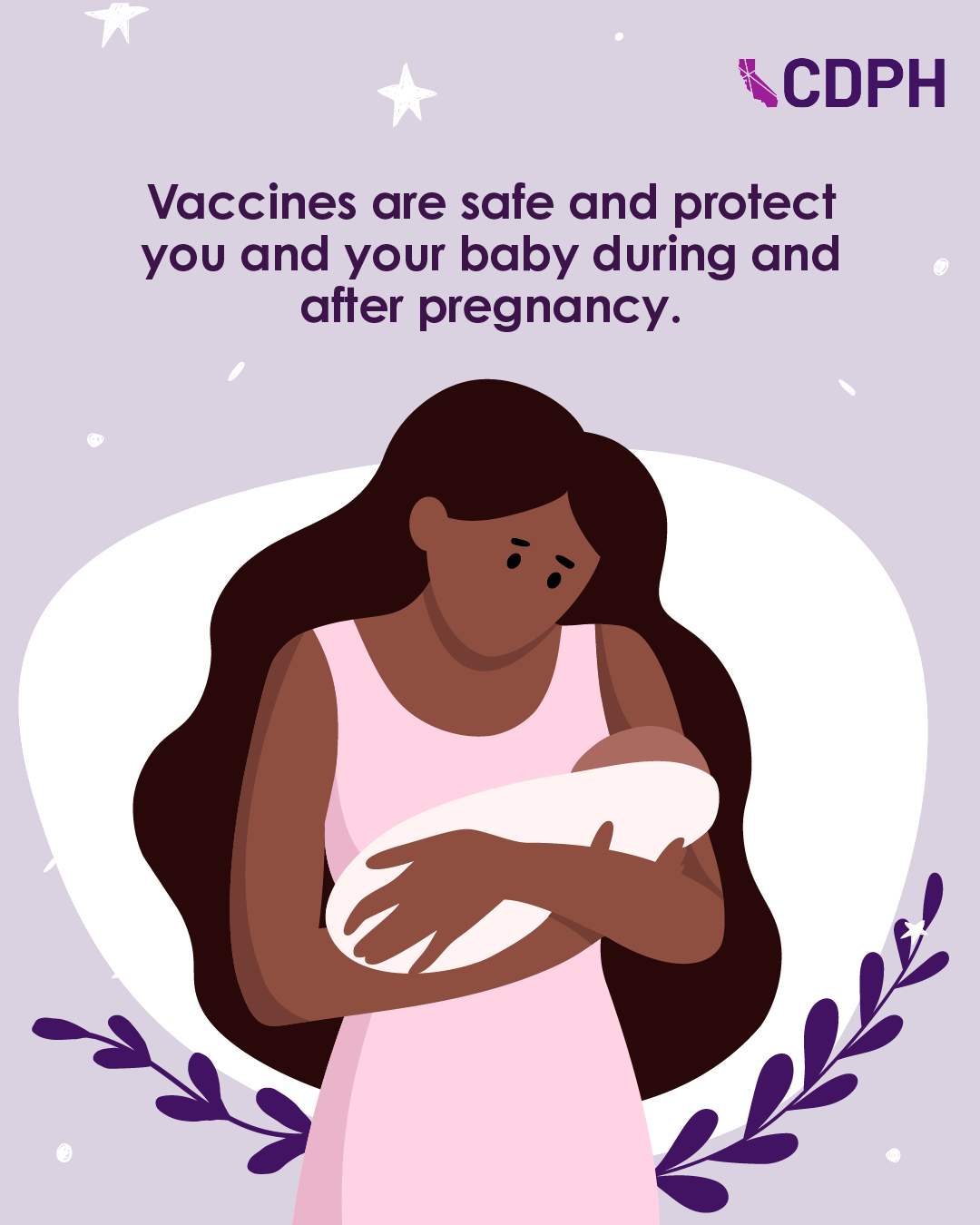
Suggested Messaging: Millions of pregnant people have safely received vaccines and given birth to healthy babies. Certain vaccines are recommended for anyone who is pregnant, including the following:
Bluesky/X: Millions of pregnant people have safely received vaccines and given birth to healthy babies. Certain vaccines are recommended for anyone who is pregnant, including flu, COVID-19, RSV and Tdap. Get vaccinated to protect yourself and your baby. go.cdph.ca.gov/pregnancyvaccines.
|
|
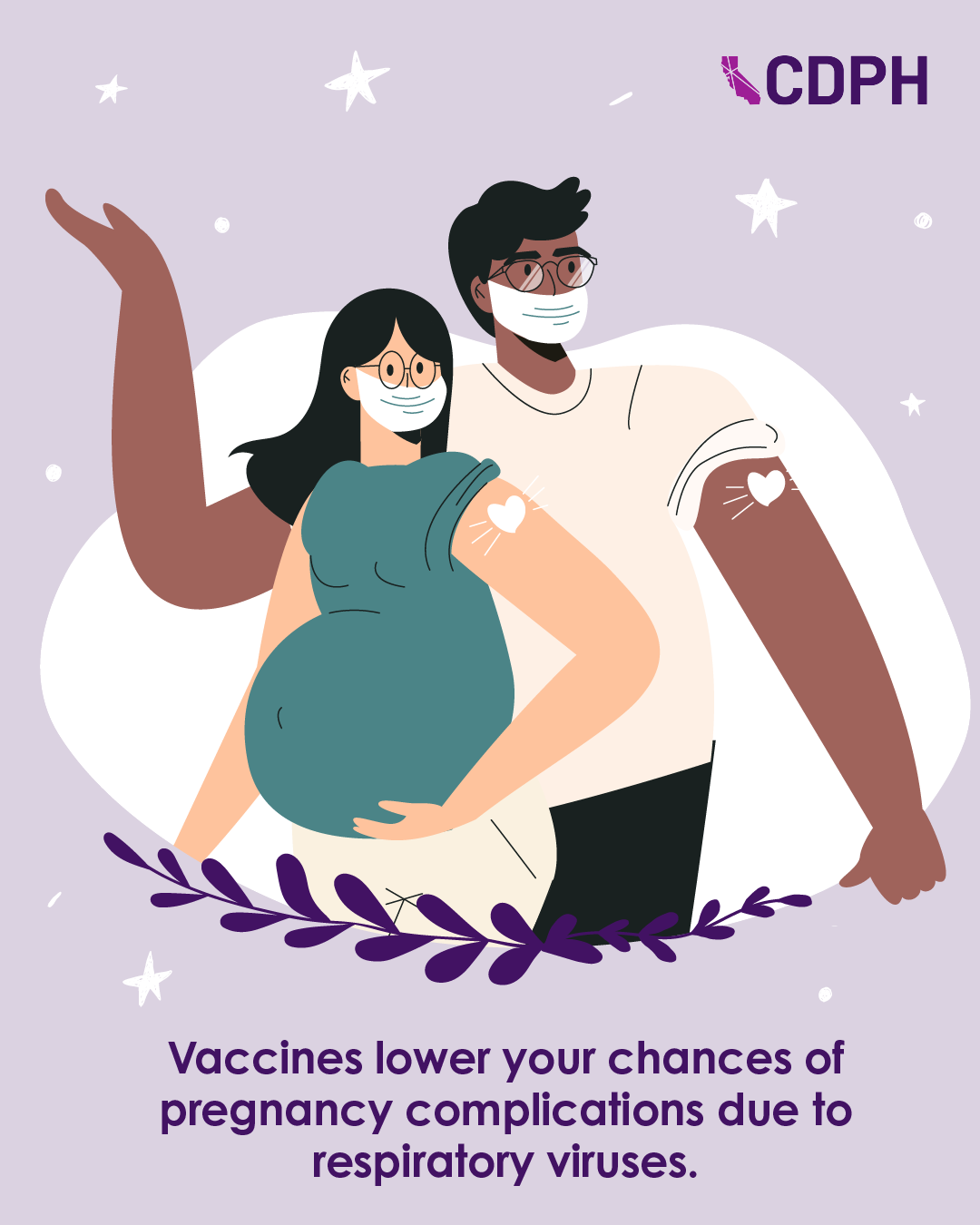
Suggested Messaging: Getting recommended vaccines while you are pregnant helps protect both you and your baby from potentially serious illnesses. It can also lower your chances of pregnancy complications, like preterm birth and delivering a baby with low birthweight.
Talk to your provider about which vaccines you need so you can be up to date before and during pregnancy. For more information, visit: go.cdph.ca.gov/pregnancyvaccines.
Bluesky/X: Getting recommended vaccines while you are pregnant helps protect both you and your baby from potentially serious illnesses. It can also lower your chances of pregnancy complications, like preterm birth. Talk to your provider about which vaccines you need. go.cdph.ca.gov/pregnancyvaccines.
|
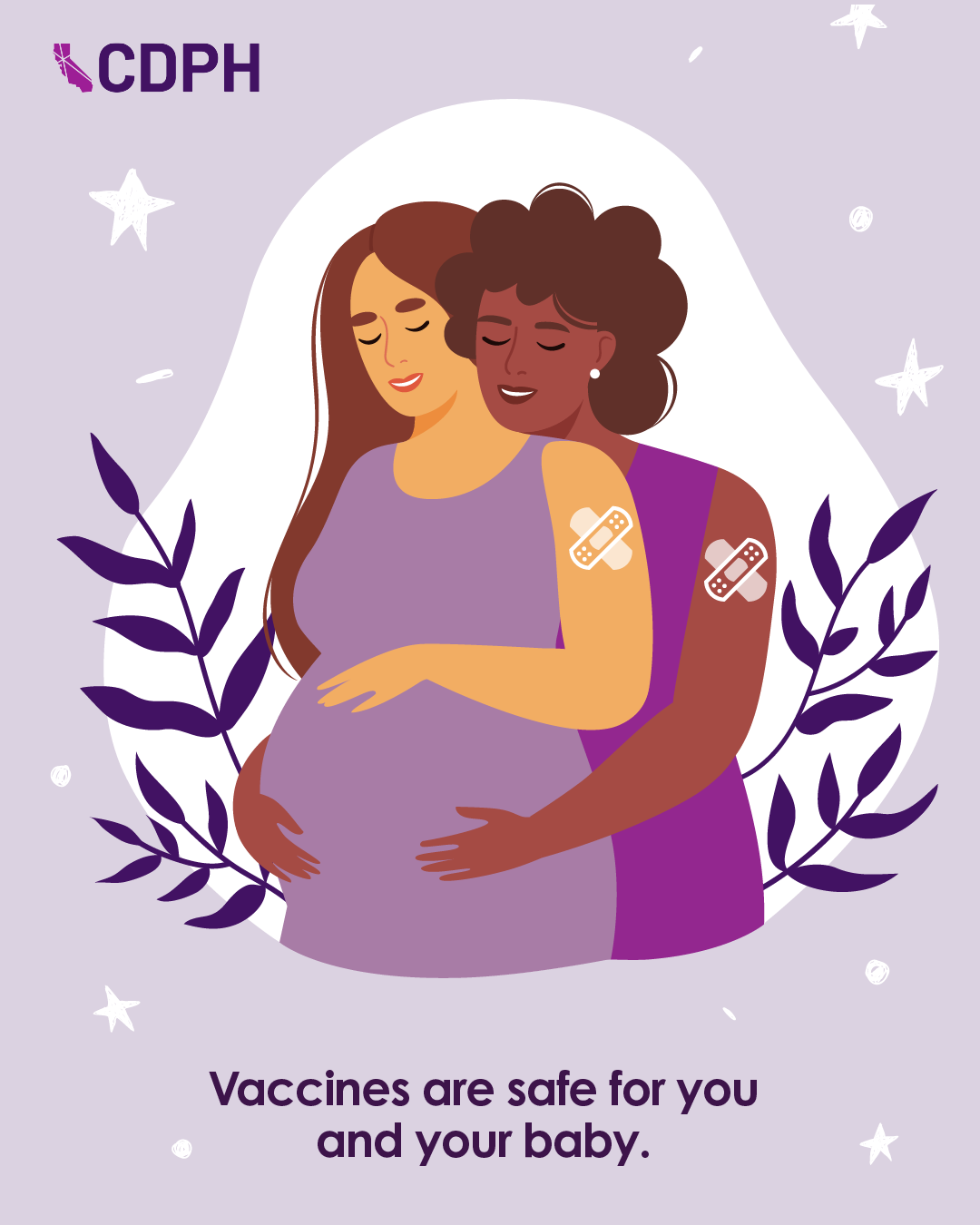
Suggested Messaging: DYK? Getting a flu shot during pregnancy can lower your risk of breathing complications and your baby’s risk of catching flu by about half. Getting a COVID-19 vaccine during pregnancy lowers the risk of the baby being hospitalized with COVID-19 by more than half.
Bluesky/X: Getting a flu shot during pregnancy can lower your risk of breathing complications and your baby’s risk of getting flu by about half. Getting a COVID-19 vaccine during pregnancy lowers the risk of the baby being hospitalized with COVID-19 by more than half. go.cdph.ca.gov/pregnancyvaccines. |
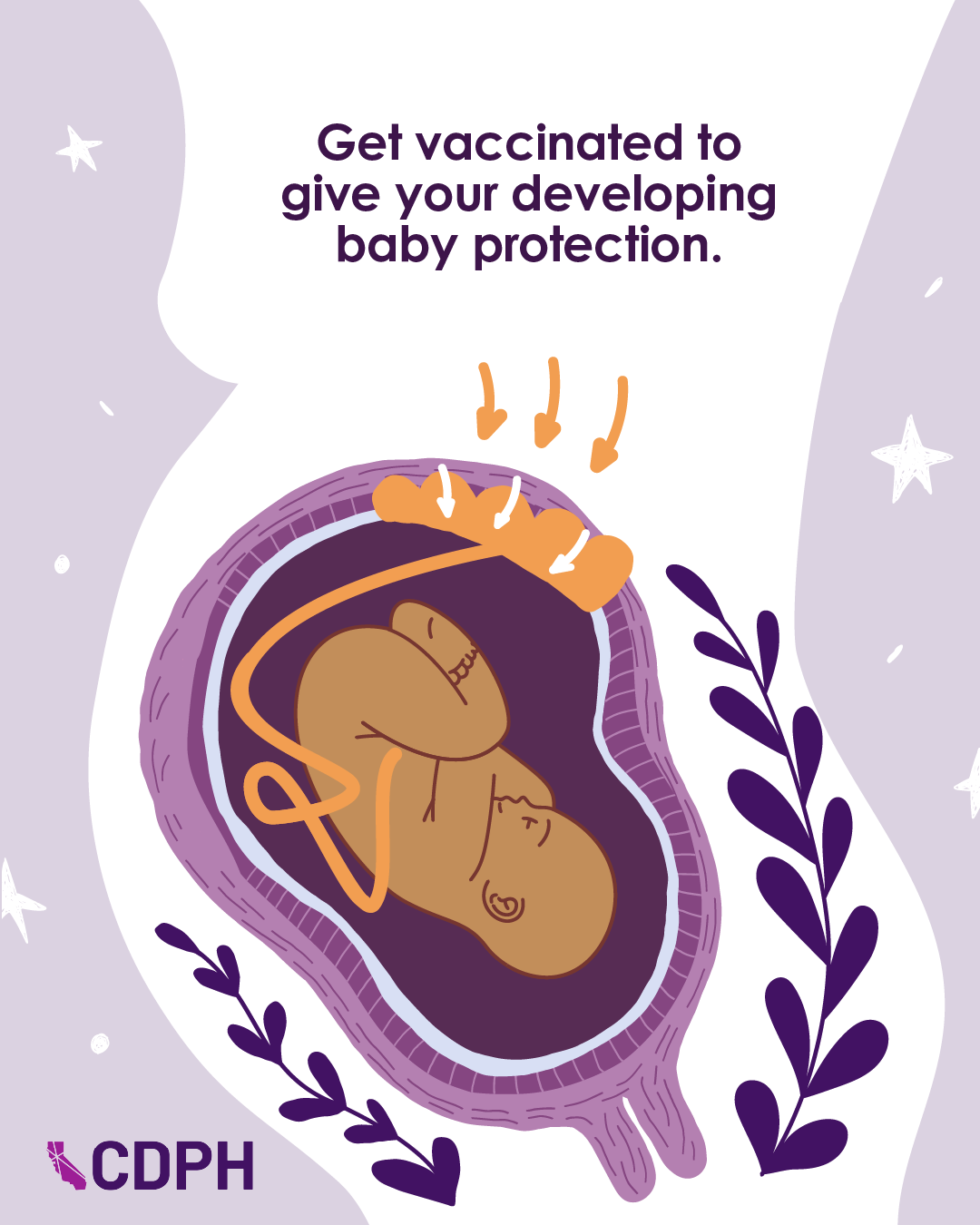
Suggested Messaging: Who benefits most from vaccines given during pregnancy? Babies. Vaccinated pregnant people pass antibodies to their developing baby in the womb. That means the baby is born with some protection against viruses during their early months of life.
Bluesky/X: Babies benefit most from vaccines given during pregnancy. Vaccinated pregnant people pass antibodies to their developing baby in the womb, which help protect them during their early months of life. Talk to your provider about which vaccines you need. go.cdph.ca.gov/pregnancyvaccines.
|
Spanish Social Media
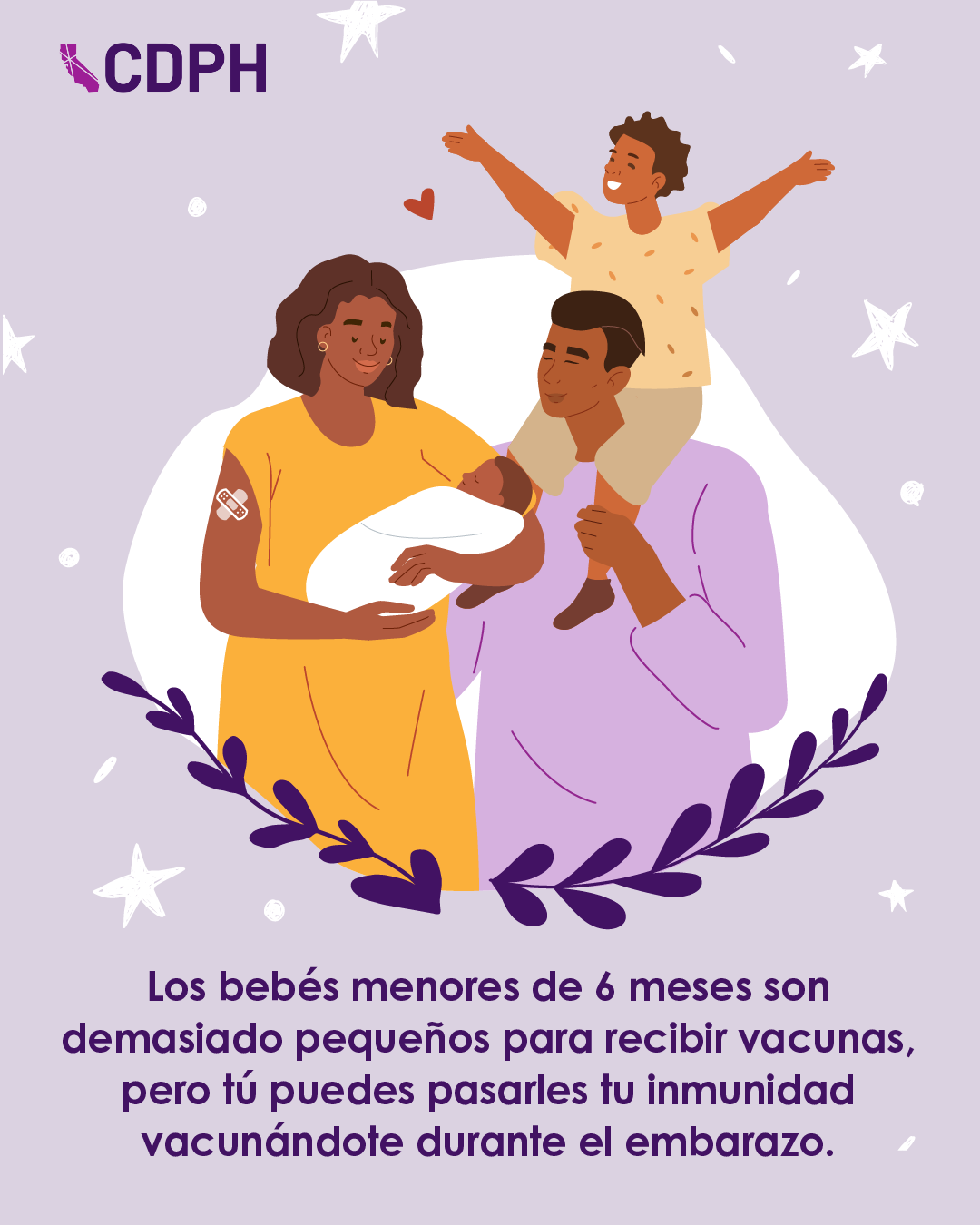
Suggested Messaging: Protege a tu familia que está creciendo. Ciertas vacunas son recomendadas para las personas embarazadas. Estas vacunas reducen las probabilidades de que tú y tu familia se enfermen gravemente o necesiten ser hospitalizados por enfermedades, como COVID-19, influenza, tosferina y VRS. Para obtener más información habla con tu proveedor de atención médica prenatal y
|
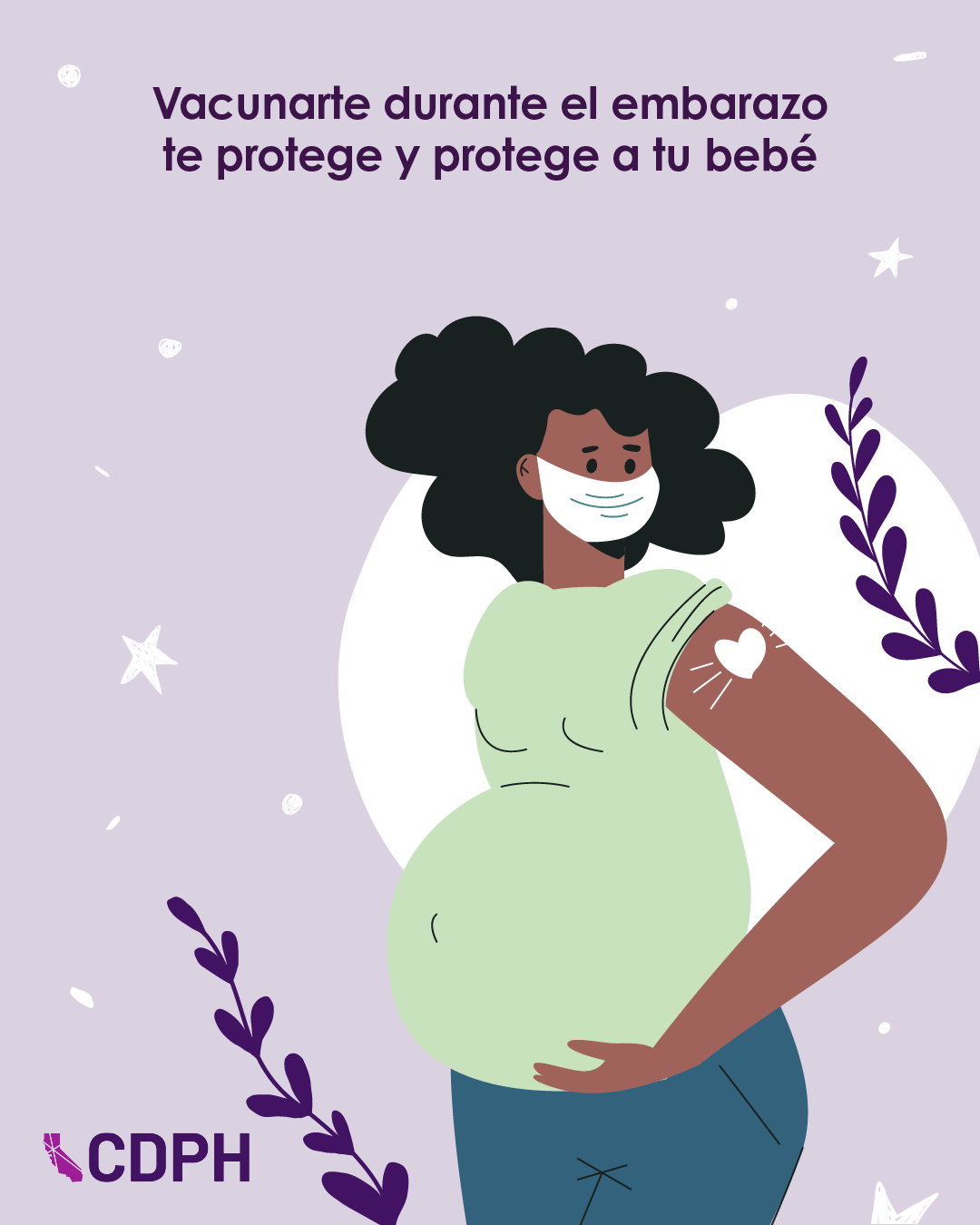
Suggested Messaging: Si estás embarazada, corres más riesgo de enfermarte gravemente, ser hospitalizada e incluso morir de ciertas enfermedades respiratorios, como COVID-19 y influenza, en comparación con las personas que no están embarazadas. Las vacunas ofrecen la mejor protección contra enfermedades como COVID-19, influenza, tosferina y VRS. Para obtener más información habla con tu proveedor de atención médica prenatal y visita: go.cdph.ca.gov/pregnancyvaccines. |
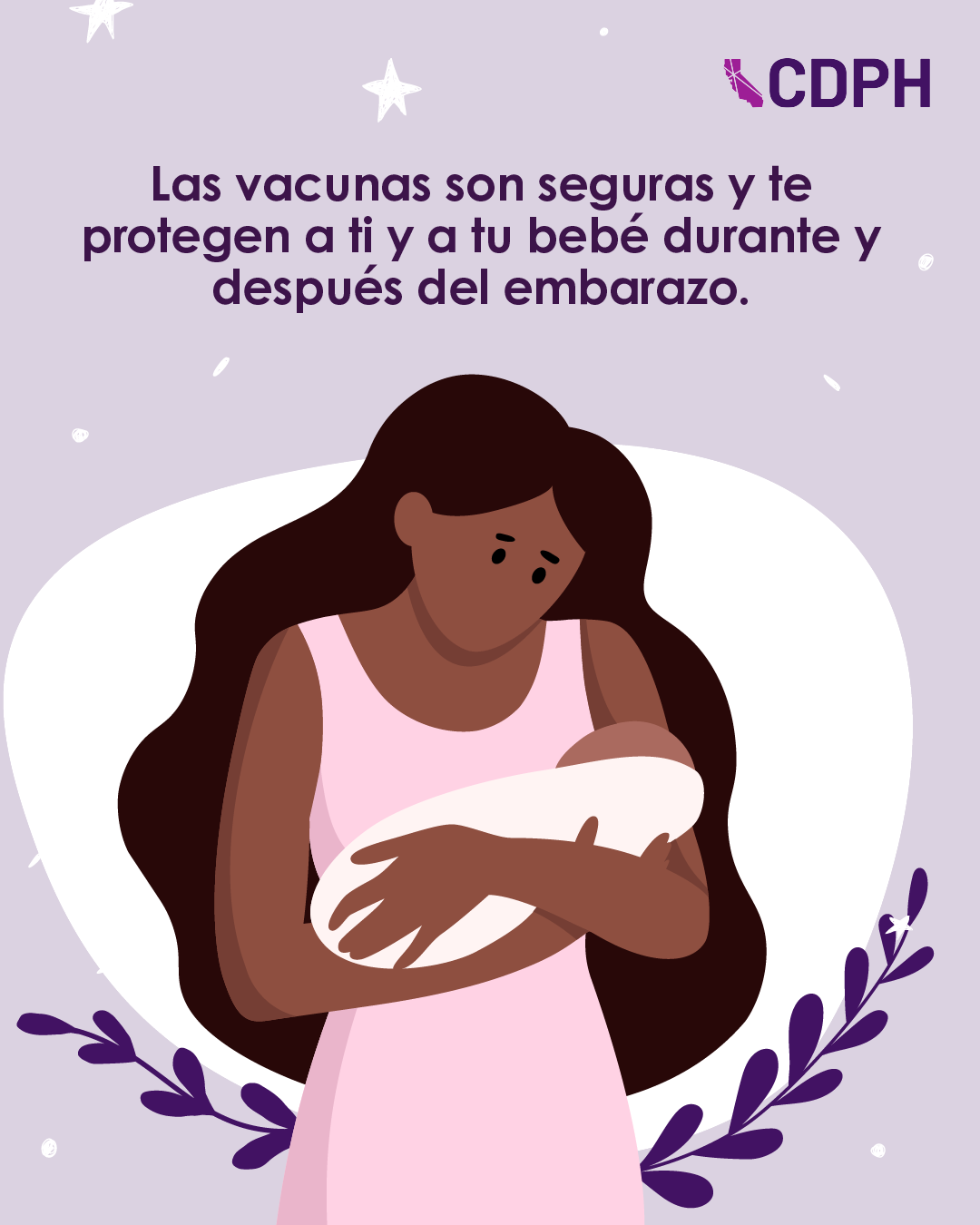
Suggested Messaging: Millones de personas embarazadas se han vacunado de forma segura y han dado a luz a bebés sanos. Ciertas vacunas son recomendadas para las personas embarazadas, incluyendo las siguientes:
- Gripe
- COVID-19
- VRS
- TDAP (Tétanos, difteria y tosferina)
|
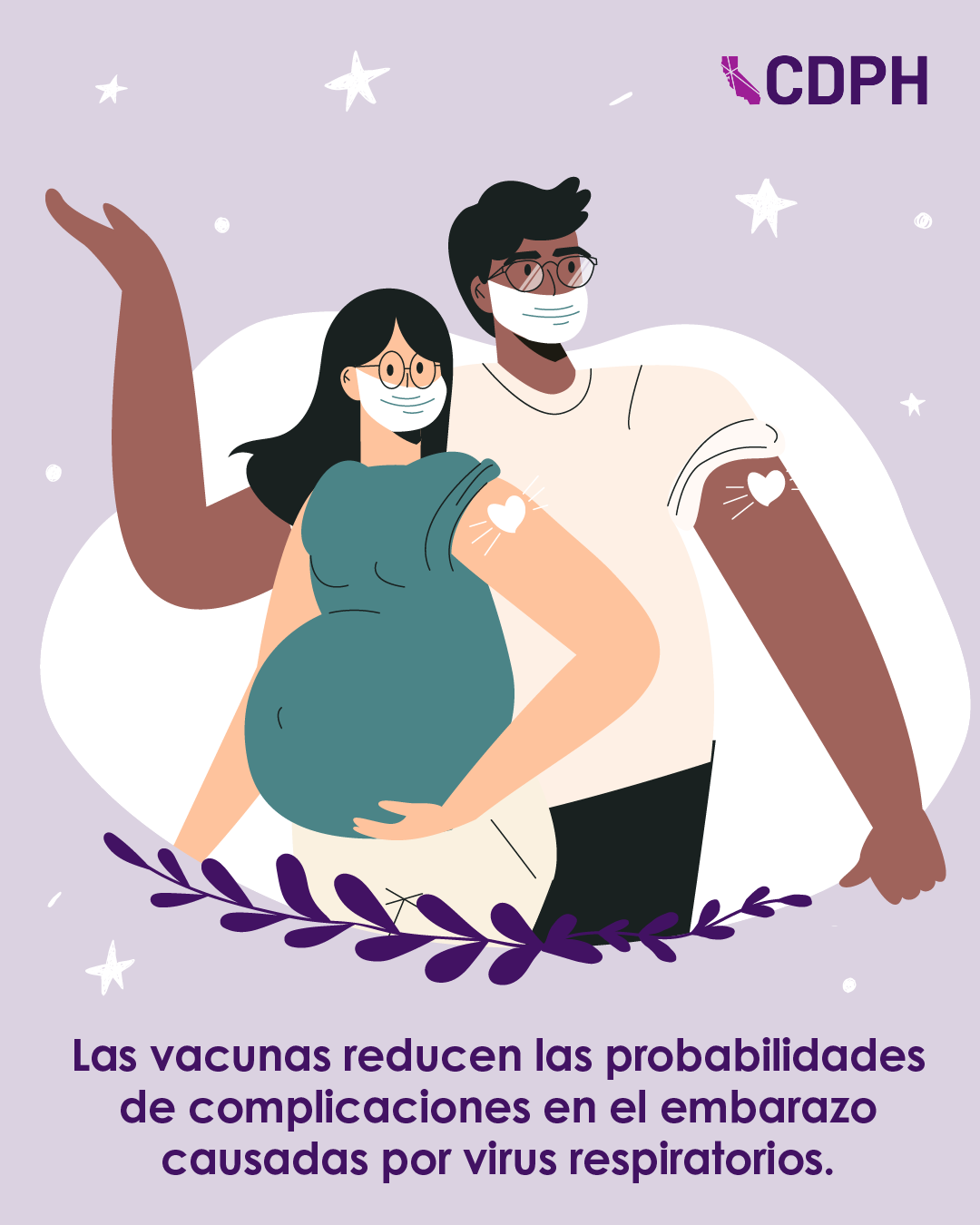
Suggested Messaging: Recibir las vacunas recomendadas durante el embarazo ayuda a protegerte y a proteger a tu bebé de posibles enfermedades graves. También puede reducir las probabilidades de complicaciones en el embarazo, como el nacimiento prematuro y dar a luz a bebés de bajo peso. Habla con tu obstetra sobre las vacunas que necesitas para que puedas estar al día antes y durante el embarazo. Para obtener más información habla con tu médico obstetra y visita: go.cdph.ca.gov/pregnancyvaccines. |
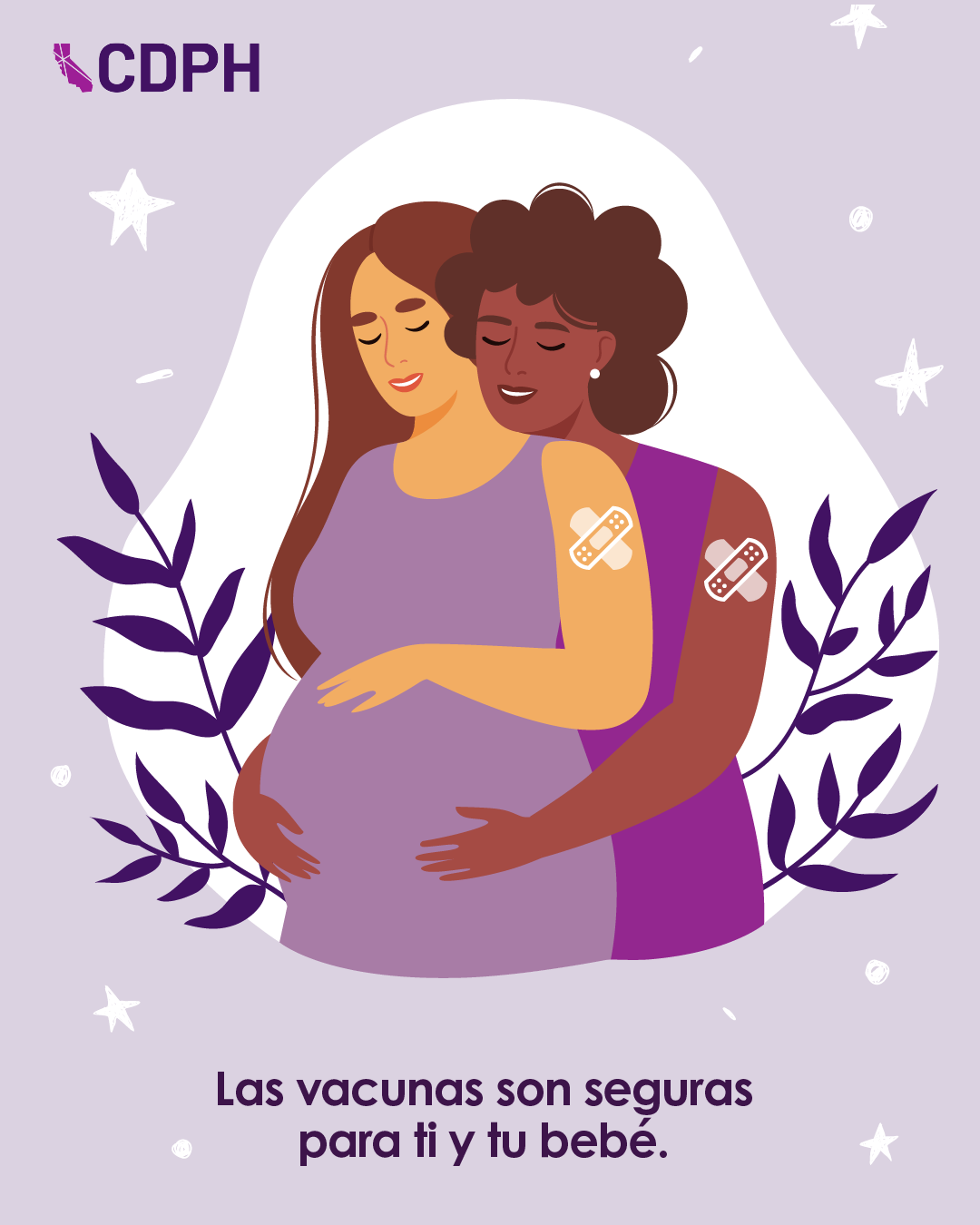
Suggested Messaging: Vacunarse contra la gripe durante el embarazo puede reducir aproximadamente a la mitad el riesgo de complicaciones respiratorias y el riesgo de que tu bebé se contagie. Vacunarte contra el COVID-19 durante el embarazo reduce a más de la mitad el riesgo de que tu bebé sea hospitalizado por COVID-19. Para obtener más información habla con tu médico obstetra y visita: |
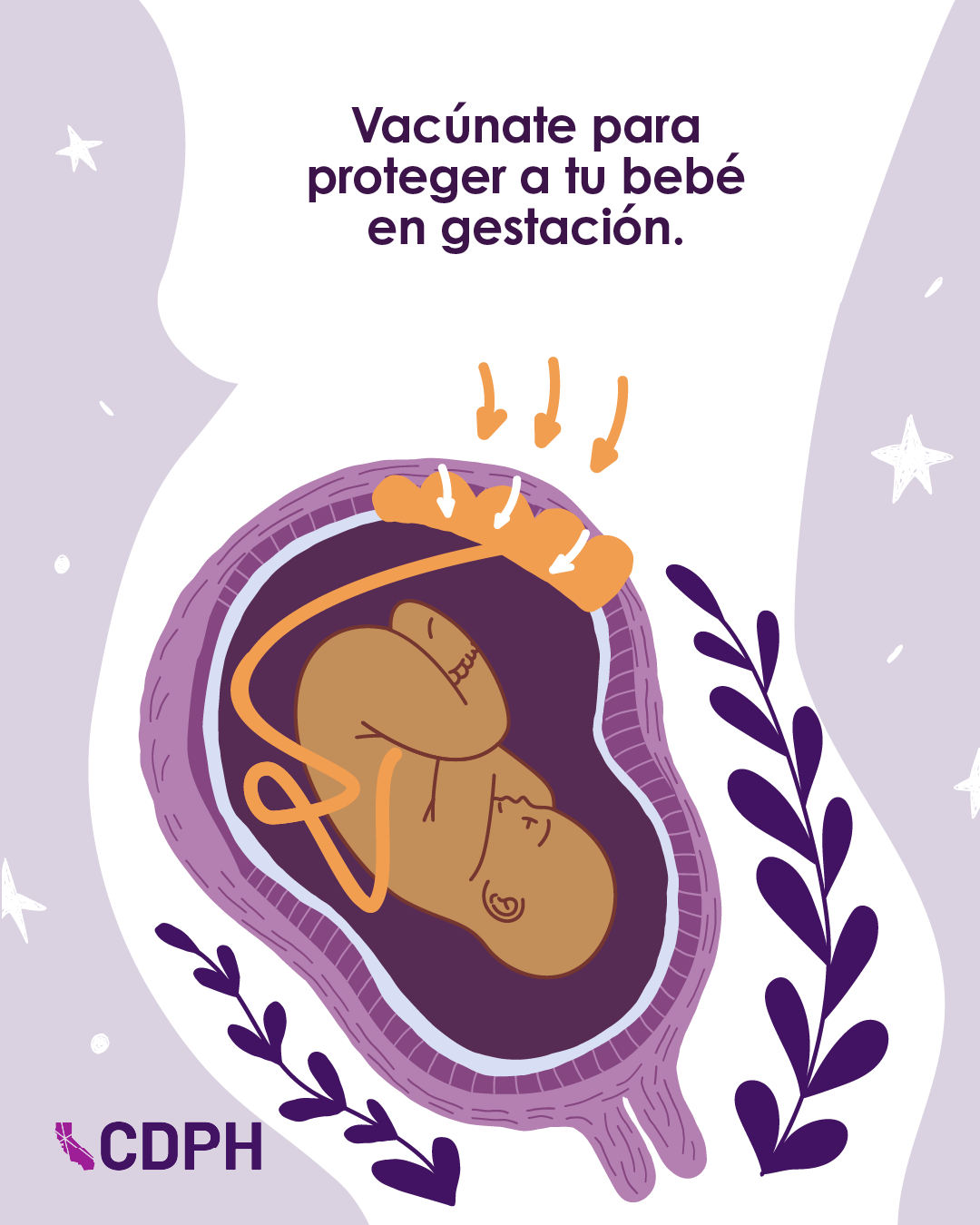
Suggested Messaging: ¿Quién se beneficia más de las vacunas recibidas durante el embarazo? Los bebés. Las personas embarazadas vacunadas transmiten anticuerpos a sus bebés en gestación. Dichos anticuerpos protegen a los bebés durante sus primeros meses de vida. P ara obtener más información habla con tu médico obstetra y visita: go.cdph.ca.gov/pregnancyvaccines. |